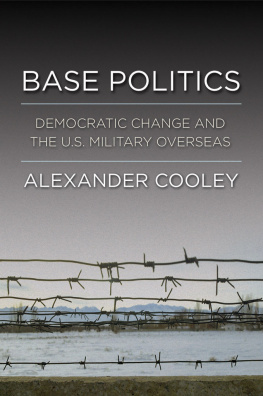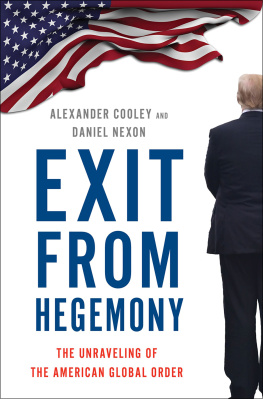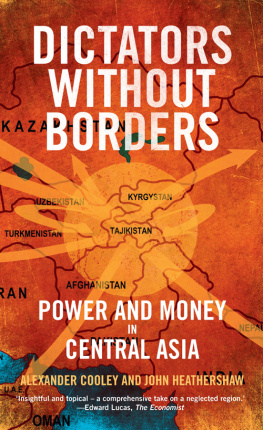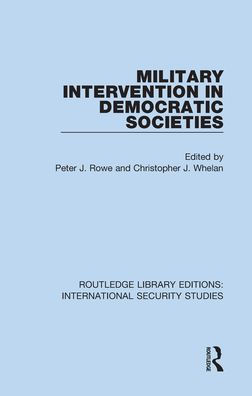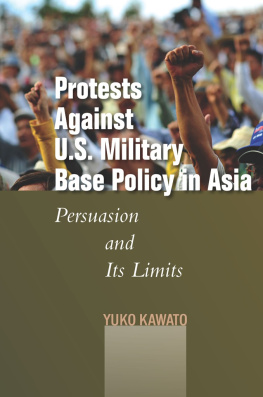Base Politics
Democratic Change and
the U.S. Military Overseas
Alexander Cooley
Cornell University Press
Ithaca and London
For Nicole Jacoby
Contents
List of Figures and Tables
Preface
1 Political Change and the Overseas American Military Presence
2 Overseas Military Basing Agreements: Issues and Methodology
3 The Philippines and Spain: In the Shadow of the Dictator
4 South Korea and Turkey: From Common Defense to Political Uncertainty
5 Okinawa and the Azores: Island Hosts and Triangular Politics
6 Japan and Italy: The Politics of Clientelism and One-Party Democratic Rule
7 Central Asia and the Global Defense Posture Review: New Bases, Old Politics
8 Conclusion: Americas Past and Future Base Politics
References
Figures and Tables
Figures
Configurations of base politics within base hosts
Changes in base politics, Spain and Uzbekistan
Major U.S. military facilities, Spain, 1984
Major U.S. military facilities, Philippines, 1979
Evolution of base politics, Spain and Philippines
Major U.S. military facilities, South Korea and Japan, 1979
Major U.S. military facilities, Turkey, 1984
Evolution of base politics, Republic of Korea and Turkey
Major U.S. military facilities, Okinawa, 2000
Major U.S. military facilities, Azores, 1975
Major U.S. military facilities, South Korea and Japan, 1979
Major U.S. military facilities, Italy, 1984
Evolution of base politics, Japan (main islands) and Italy
Central Asia and major foreign military installations, 2004
U.S. troop levels, East Asian hosts
U.S. troop levels, southern European hosts
Tables
Location, size, and value of U.S. military installations, 2006
Effects of a host countrys political institutions on contractual credibility
Worldwide waivers of host-country primary authority in cases of concurrent jurisdiction
Selected host-nation support for U.S. stationing costs
U.S. troop deployments for selected major overseas hosts
Waivers of criminal jurisdiction in the Philippines, 195464
Criminal jurisdiction in Spain under the 1982 and 1989 agreements
Criminal jurisdiction and waiver rates under the U.S.-ROK SOFA
Japanese public opinion about U.S. bases, 195058
Permission by southern European countries to use bases for major U.S. military campaigns
Rates of public opinion (%) favorable to the United States among major U.S. military base hosts
Preface
Originally a scholar of post-Soviet politics, I was amazed when the United States established military bases on former Soviet territory in Central Asia to support its 2001 campaign in Afghanistan. As the security partnership between the United States and Uzbekistan and Kyrgyzstan strengthened over the next few years, I suspected that the internal consequences of the presence of U.S. bases were far more important than Western officials and the media acknowledged or cared about. Whether intended or not, the U.S. military presence in these countries functioned as a U.S. endorsement of host governments and their actions. Hence, as political challenges to these regimes mounted in 2005, the U.S. military found itself in the crosshairs of the regions internal democratizing shifts and backlashes. Now, in late 2007, the United States has been evicted from Uzbekistan, and its position in Kyrgyzstan looks increasingly precarious.
The base politics of Central Asia are just the latest recurrence of a set of political dynamics that have surrounded U.S. bases in other eras and regions. Although U.S. policymakers and scholars have consistently overlooked the internal political dimension for host countries, U.S. overseas bases and their governing arrangements repeatedly have been implicated in those countries democratic struggles, authoritarian propaganda, populist election campaigns, and political infighting and factionalism. These internal political developments have also had tangible operational consequences, as several base hosts have challenged and evicted U.S. forces from their territory, often for reasons that had little to do with the conduct or policy of the United States. Given the hundreds of U.S. military installations scattered across more than a hundred overseas countries and territories, the dearth of comparative political analysis on the issue is puzzling.
As I pursued this topic, I was not fully prepared for the scale of the project to which I was committing myself. From 2003 to 2006, I conducted field research in ten base hosts, across Asia, Europe, and the postcommunist states; this research now comprises the main case studies of this book. Each trip yielded fascinating insights and fresh understandings of these political dynamics. I made it a point to interview as many actors as possible with different interests and stakes in the basing issue. U.S. political and military officials, host-country defense officials, local politicians, antibase activists, journalists, academics, security analysts, contractors, business representatives, and base workers all contributed to my research findings and the development of these arguments. I learned as much about these countries rich political histories and institutions as I did about the basing issue.
In short, I found that the U.S. basing presence means different things to different actors and that these views, even for the same actor, vary considerably over time. For some a basing agreement with the United States is a guarantee of security and alliance, whereas for others it may be a political endorsement of the ruling regime or a lucrative economic opportunity. Some politicians regard an American base as a symbol of violated national sovereignty, U.S. imperialism, and political struggle, whereas others arent particularly bothered by its presence or regard it as a routine matter for technocrats to manage.
From an academic perspective, the study of base politics is not easily slotted into either of the established political science subfields of international relations or comparative politics. Bases are the products of international security agreements, but as discrete communities they also interface politically, economically, and socially with their hosts. Moreover, many base-related issues traverse additional disciplines such as international law, international negotiation, institutional economics, sociology, and media studies. I suspect that the boundaries of our modern social sciences, as well as the persistent walls that separate specialists of different regions, are the reasons we dont have more comparative studies on the subject.
Yet I am now convinced, even if we allow for historical nuance and regional specificity, that many of these political patterns can be analytically identified and even predicted. This book attempts to make some sense of base politics and provides a theory that explains some of its major trends across different countries and eras.
The funds required to complete this research have been considerable, and I deeply appreciate various organizations for their support and commitment to the project. A grant from the Carnegie Corporation of New York to Columbia Universitys Institute for War and Peace Studies allowed me, along with my colleague Kimberly Marten (with Page Fortna and Tanisha Fazal as fellow grantees), to conduct field research in Okinawa and the Japanese main islands (MayJune 2003), South Korea (June 2004), and Kyrgyzstan (January 2005).
I am also grateful to the German Marshall Fund of the United States (GMF), which not only supported me as a research fellow during my academic leave (20045) but also awarded me a Transatlantic Fellowship that supported my residence at the GMF Transatlantic Center in Brussels in 2005 and provided a world-class network of resources and contacts. These greatly facilitated my trips to Spain (April 2005), Portugal and the Azores (May 2005), and Romania (July 2005). In particular I thank Ron Asmus, Bill Drozdiak (now President of the American Council on Germany), John Glenn, and Corinna Hrst. A travel grant from Barnard College, as part of my Special Assistant Professor Leave, supported these trips as well as my visits to Greece (October 2004), Turkey (November 2004), and Italy (April 2006). I also thank the Smith Richardson Foundation for awarding me a Junior Faculty International Security and Foreign Policy grant for 2007 that allowed me to update and finish the book in a timely fashion. Finally, publication of this book was made possible in part by Columbia Universitys Harriman Institute, and I am grateful for the institutes enduring support.

